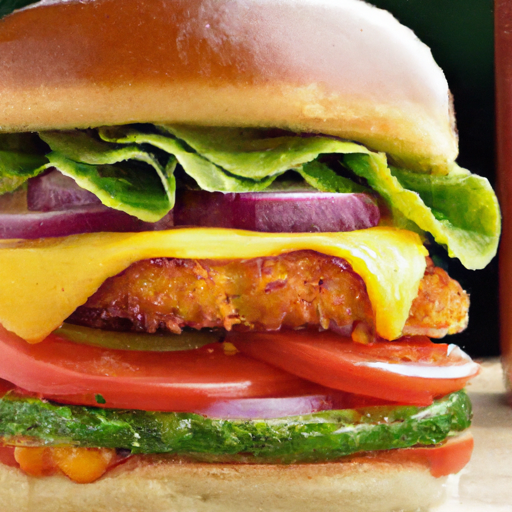The Meatless Burger: A Delicious and Nutritious Alternative
In recent years, meatless burgers have gained immense popularity, attracting meat lovers and vegetarians alike. These innovative creations mimic the taste and texture of traditional meat burgers while offering a sustainable and healthy alternative. Whether you follow a plant-based diet or simply want to reduce your meat consumption, the meatless burger is a delectable choice that will satisfy your cravings.
The Taste and Texture
You might be skeptical about whether a meatless burger can measure up to its meaty counterpart, but prepare to be pleasantly surprised. Advances in plant-based technology have allowed for the creation of veggie burgers that imitate the juicy, savory flavors and satisfying mouthfeel of beef burgers.
Made primarily from plant proteins such as soy, wheat, and pea, meatless burger patties are seasoned with a blend of spices to replicate the complex umami flavor characteristic of meat. When cooked, these patties brown beautifully and develop a slightly crispy exterior while maintaining a moist and tender interior. Topped with traditional condiments like lettuce, tomato, and pickles, you’ll find it difficult to distinguish a meatless burger from the real thing!
Versatility in Cooking
Meatless burgers are a versatile ingredient that can be used in various cooking applications. While grilling is the most common method, these sturdy patties can also be baked, sautéed, or pan-fried to perfection. Their adaptability makes them suitable for a range of dishes beyond the classic cheeseburger.
Consider breaking up a meatless burger patty to create a flavorful and protein-packed filling for tacos, wraps, or stuffed bell peppers. Crumble the patty and mix it with your favorite seasonings for an enticing addition to pasta sauces, chili, or lasagna. From sliders and kebabs to meatless meatball subs, the options are abundant when it comes to exploring the culinary possibilities of the meatless burger.
Nutritional Value
Meatless burgers offer a nutritious alternative to traditional meat burgers. Packed with plant-based proteins, they provide essential amino acids while being lower in saturated fat and cholesterol. Additionally, many meatless burger brands fortify their products with vitamins and minerals, ensuring a well-rounded nutritional profile.
The plant-based proteins found in meatless burgers are not only beneficial for your health but also have a lower environmental impact compared to meat production. By opting for meatless options, you contribute to reducing greenhouse gas emissions and saving precious resources like water and land.
The Rise of the Meatless Burger
The history of the meatless burger traces back many decades, and early attempts at creating plant-based alternatives were less than appetizing. However, modern advancements in food science and consumer demand have propelled the meatless burger to new heights.
In recent years, major food companies and startups have invested significant resources in developing meatless burger alternatives that genuinely mimic the taste, texture, and appearance of meat. This market growth has been met with enthusiasm from consumers worldwide, leading to the widespread availability of meatless burgers on restaurant menus, in fast food chains, and on grocery store shelves.
Conclusion
The rise of the meatless burger presents an exciting opportunity for food enthusiasts to explore a sustainable and healthy alternative to traditional meat burgers. With their delightful taste, versatility in cooking, and nutritional value, meatless burgers have earned their place as a staple on the modern menu.
Whether you choose to incorporate them into your weekly meal plan or simply want to enjoy a guilt-free burger every now and then, the meatless burger offers a delicious, nutritious, and eco-friendly solution that will satisfy your cravings without compromising flavor or texture.
Meatless Burger
Origin: The concept of meatless burgers dates back to ancient times, with cultures such as the Greeks and Romans developing vegetarian dishes made from various ingredients. However, the modern meatless burger as we know it today originated in the 20th century with the rise of vegetarian and vegan movements.
Common Uses: Meatless burgers are commonly used as a plant-based alternative to traditional meat burgers. They are often grilled, pan-fried, or baked and are served in hamburger buns with various toppings such as lettuce, tomatoes, pickles, and condiments.
Nutritional Benefits: Meatless burgers are generally lower in calories and saturated fat compared to traditional meat burgers. They can provide a good source of protein, dietary fiber, and essential nutrients such as iron and vitamin B12 if they are fortified with these nutrients.
Unique Properties: Many meatless burgers are designed to mimic the taste, texture, and appearance of a traditional beef burger. They are often made from a combination of plant-based proteins such as soy, wheat, or peas, along with other ingredients like vegetable oils, spices, and binders.
Historical Significance: The introduction of meatless burgers into mainstream culture is seen as a significant development in the food industry. It has provided an alternative for individuals who choose to follow vegetarian or vegan diets, or those looking to reduce their meat consumption for environmental or health reasons. The popularity of meatless burgers has grown rapidly in recent years, with an increasing number of restaurants and fast-food chains offering plant-based options on their menus.




Use the share button below if you liked it.
It makes me smile, when I see it.